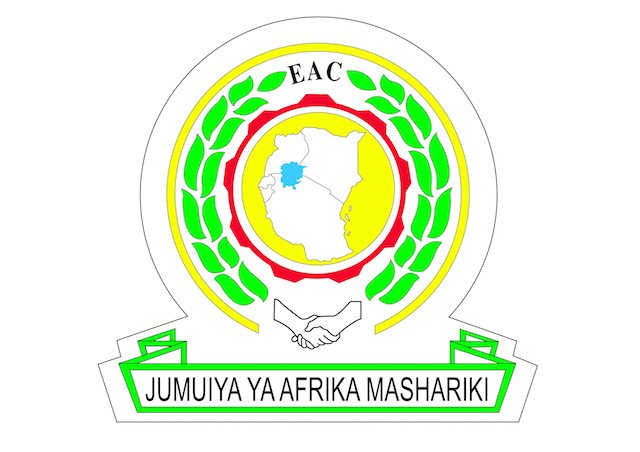
EAC Region intensifies preparedness as Ebola in the Democratic Republic of Congo near borderline
East African Community Headquarters, Arusha, Tanzania, 5th October, 2018: The East African Community (EAC) Partner States have intensfied efforts for preparedness and response following the Ebola outbreak in Democratic Republic of the Congo (DRC). In a two day joint technical meeting involving the EAC Partner States (Burundi, Kenya, Rwanda, South Sudan, Tanzania and Uganda) and the DRC held on 2nd and 3rd october 2018 in Entebbe, Uganda, all states reported a high alert position.
In the meeting, which was organised by the EAC Secretariat with support from various partners, the EAC Acting Head of Health, Dr. Michael Katende observed that the risk of Ebola Virus Disease (EVD) for EAC Partner States was real and high. The Risk of EVD outbreak is hightened especially for those Partner States that share the border with DRC due to high of volume of people moving across the borders for trade and other reasons, but also due to the high Influx of refugees, into the EAC region.
At the meeting, the DRC was represented by a 12 man delegation, with a wealth of experience.
The meeting discussed the strengthenining of cross border disease surveillence and emergency preparedness and response. The meeting noted that the current outbreak in Beni town of the DRC was closer to Uganda’s border hence more efforts for active surveillance. Key to sucess of the efforts employed so far is that there were no confirmed cases of EVD in any of the EAC Partner States.
According to the delegation from DRC and World Health Organisation (WHO), the current EVD outbreak in North Kivu and Ituri provinces in DRC was escalated by worsening insecurity, mistrust from affected communities, and extension into previously unaffected areas. As of 2ndOctober 2018, a total of 161 case had been reported, 129 confirmations and a case fatality rate of 57%.
All EAC Partner States at the meeting are currently on a high alert following the July 28th announcement of EVB outbreak in North Kivu and Ituri provinces by WHO, and have undertaken various preparedness and response activities in case of an outbreak. All countries have undertaken evaluation of their national contigency plans for outbreak response and the capacities to implement them, activated emergency coordination structures with Rapid Response Teams (RRT) at all levels to monitor and respond in case of an outbreak. Emergency Operations Centers (EOC) have also been established to support the structures.
The staff managing the EOC and RRT have been trained and provided with appropriate equipment to detect and manage the outbreaks. Ambulances for patient transportation, sample storage and transportation, isolation/quarantine facilities, treatment facilities following International Health Regulations (IHR) have also been put in place.
Further the EAC Partner States and DRC have continued to build capacity of frontline health workers in high risk districts, including comunity health workers and security personnel.
In an effort to detect and quickly respond to an outbreak, the EAC Partner States have mapped areas, which have been categorised as High, Medium or Low risk and respoense mechanisms have been put in place. These include among others; Airports, crossborder entry and exit points and high economic activity areas like markets.
Border entry screening at all major border points in all high-risk districts have also been established. High and medium risk areas are being given special attention in terms of training of staff, supply of Personal Protective Equipment (PPE), continuious screening among others. Using volunteers, and infrared thermometers, everyone crossing into Uganda from DRC is screened for body temperature. Those found with high temperature are further screened for Ebola-like symptoms.
On average, the busy border screening points receive 5,000 people, however during market days, the number grows tremendously; for instance, Mpondwe border point registers over 20,000 people during the market days - every Tuesday and Friday.
With support from WHO, the Republics of Uganda and Rwanda have also considered and plan to use of the Ebola Zaire Vaccine, specifically targeting frontline health workers who are managing the situation.
While the Republic of Burundi has employed using Rapid Diagnostic Test Kits (RDTs) to screen/test for EVD. The Republic of South Sudan (RSS) has made arrangements to refer samples to Uganda Virus Research Institute(UVRI) for testing.
In preparation for any suspected case, Ebola Treatment Units (ETUs) have also been set up at Bundibugyo General Hospital, Bwera Hospital in Kasese, Rwebisengo Health Center in Ntoroko district and another is under construction at Naguru Friendship Hospital in Kampala.
These are fully equipped and on standby to manage any alert or suspect or confirmed case.
Risk communication and community engagement are also ongoing. Teams are engaged in door to door visits and distribution of Information Education Communication (IEC) material. Further to this, messages are also running on TV and radio to reach the wider public within and outside the high-risk districts.
The Public is urged to be on high alert too by observing a high sense of personal hygiene, avoid overcrowded places, direct contact with other people and to report cases of high temprature and bleeding from ears, nostrils and mouth to the nearest health facilities.
- ENDS-
For more information please contact:
Owora Richard Othieno,
Head of Department,
Corporate Communications and Public Affairs;
Tel: +255 784 835021;
Email: This email address is being protected from spambots. You need JavaScript enabled to view it.
About the East African Community Secretariat:
The East African Community (EAC) is a regional intergovernmental organisation of five Partner States, comprising Burundi, Kenya, Rwanda, Tanzania and Uganda, with its headquarters in Arusha, Tanzania.
The EAC Secretariat is ISO 9001:2008 Certified
Tags: Ebola
